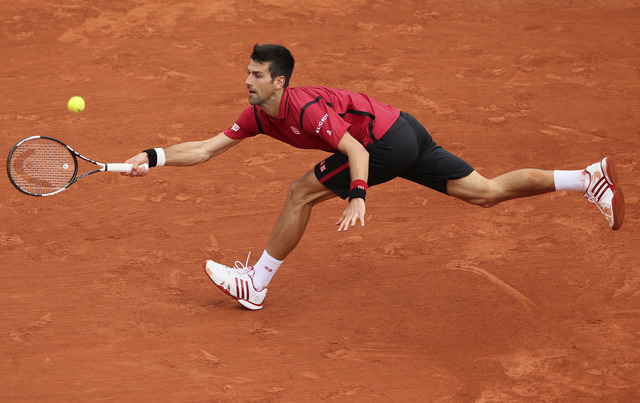PARIS — A French Open champion at long last, and the first man in nearly a half-century to win four consecutive major championships, Novak Djokovic grabbed a racket and etched a heart in the very red clay that had given
PARIS — A French Open champion at long last, and the first man in nearly a half-century to win four consecutive major championships, Novak Djokovic grabbed a racket and etched a heart in the very red clay that had given him such heartache in the past.
Then, when he finally was handed the La Coupe des Mousquetaires — the one trophy he truly yearned for, the one he needed to complete a career Grand Slam — Djokovic held it overhead, his eyes shut, before kissing it, exhaling and smiling broadly. Later, Djokovic’s father and friends sipped champagne from it.
In his 12th appearance at Roland Garros, and fourth final, the top-seeded Djokovic earned that elusive title with a 3-6, 6-1, 6-2, 6-4 victory over No. 2 Andy Murray on Sunday, buoyed by a supportive crowd that repeatedly chanted his nickname, “No-le!”
“It’s really a very special moment,” Djokovic said. “Perhaps the greatest moment of my career.”
Since losing the 2015 final in Paris, Djokovic has won 28 Grand Slam matches in a row, from Wimbledon and the U.S. Open last year, to the Australian Open in January, and now, after quite a wait, the French Open.
“This is something that is so rare in tennis,” said Murray, who is now 2-8 in Grand Slam finals. “It’s going to take a long time for it to happen again.”
The last man to hold all four major titles simultaneously was Rod Laver in 1969, when he earned a calendar-year Grand Slam. Djokovic now can set his sights on that ultimate tennis achievement; he’s the first man since Jim Courier in 1992 to get halfway.
Djokovic, a 29-year-old from Serbia, owns six titles from the Australian Open, three from Wimbledon and two from the U.S. Open for a Grand Slam total of 12. Among men, only Roger Federer (with 17), Rafael Nadal (14) and Pete Sampras (14) have more. Djokovic is also one of eight men with at least one championship at each major.
“He’s there, for sure — one of the best now,” said Marian Vajda, Djokovic’s co-coach with Boris Becker, one of the many stars of the sport who never won the French Open. “Hard to say who’s the greatest.”
Of Djokovic’s 11 career losses at Roland Garros, six came against Nadal, one against Federer. Three came in finals, against Nadal in 2012 and 2014, and against Stan Wawrinka a year ago, when Djokovic’s eyes welled with tears and the arena feted him with an unusually long ovation as he accepted his runner’s-up plate.
Djokovic’s 2016 path was unencumbered by any member of that trio: Federer withdrew before the tournament and Nadal before the third round, both citing injury; Wawrinka lost to Murray.
Still, Djokovic’s most imposing adversary might very well have been the knowledge that the tournament that meant the most to him was the only tournament he couldn’t conquer.
Until now.
“Winning it, you know, I felt it,” Djokovic said. “I felt the tension and excitement. All the emotions. You name it.”
When Djokovic sketched a valentine to his fans and then laid down on his back, it repeated a gesture made famous by three-time French Open champion Gustavo Kuerten.



